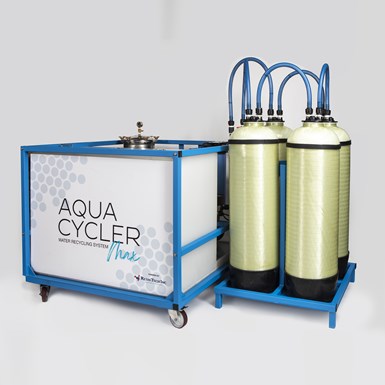Advanced Aqua Cycler for Enhanced PFAS and Metal Removal
ResinTech has launch an advanced model of the Aqua Cycler, specifically engineered to tackle the increasing challenges of PFAS contamination.

ResinTech unveiled an Aqua Cycler model targeting PFAS and metal contaminants. This advanced system integrates SIR-110-HP resin, renowned for PFAS removal, alongside metals, ensuring operators achieve regulatory compliance while providing clean DI water for operations.
Mike Warner, president of ResinTech's Regeneration Services, emphasized the industry's need amidst stricter PFAS regulations, stating, “Our latest Aqua Cycler directly addresses the compliance challenge without sacrificing quality, aiding operators to navigate the evolving regulatory landscape.”
ResinTech, a leader in water treatment solutions, demonstrates its commitment through the Aqua Cycler, highlighting its dedication to addressing the industry’s water treatment challenges.
Related Content
-
Plasma Electrolytic Oxidation (PEO): A High-Performance Coating for Light Metal Alloys
Plasma Electrolytic Oxidation (PEO) offers an innovative approach to high-performance coatings for light metal alloys, providing superior alternatives to traditional hard anodizing. The process transforms the surface of metals like Al, Mg and Ti into a robust oxide layer with customizable properties, tailored for demanding applications in aerospace, semiconductor, and industrial manufacturing.
-
Looking to the Future of Finishing
Products Finishing takes a look at some of the ways the finishing industry is investing in workforce development and educational initiatives.
-
Practical Observations in Surface Chemistry and Boundary Layer Control to Enable Scalable Electrochemical Operation - The 57th William Blum Lecture
This paper is based on the 57th William Blum Memorial Lecture at SUR/FIN 2023, in Cleveland, Ohio on June 8, 2023, by Dr. Tim Hall, recipient of the 2023 NASF Scientific Achievement Award. It focuses on the practical effects of controlling the boundary and surface chemistry on a wide range of electrochemical applications. After a brief introduction to the concept and principles of surface and boundary layer properties during electrochemical processes, the use of this approach in controlling various physical properties during electroplating and electrochemical finishing is discussed, including controlling coating stress and metal composition, as well as enabling simple water-based electrolytes to polish passive or complex materials.












